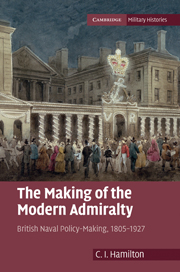Book contents
- Frontmatter
- Contents
- List of tables
- Preface
- Introduction
- 1 Lord Barham's Admiralty: 1805
- 2 Admiralty reform, 1806–1835
- 3 Decision-making at the Admiralty, c. 1806–1830
- 4 Admiralty administration and decision-making, c. 1830–1868. The Graham Admiralty
- 5 The Admiralty reformed again: context and problems, 1868–1885
- 6 Administrative and policy-making responses, c. 1882 onwards
- 7 Fisher and Churchill, and their successors, 1902–1917
- 8 The Naval Staff, planning and policy
- 9 Lord Beatty's Admiralty
- Conclusion
- Appendix 1 First Lords, First Sea Lords and Permanent Secretaries, 1805–1927
- Appendix 2 Acronyms and definitions
- Manuscript sources and select bibliography
- Index
9 - Lord Beatty's Admiralty
Published online by Cambridge University Press: 03 May 2011
- Frontmatter
- Contents
- List of tables
- Preface
- Introduction
- 1 Lord Barham's Admiralty: 1805
- 2 Admiralty reform, 1806–1835
- 3 Decision-making at the Admiralty, c. 1806–1830
- 4 Admiralty administration and decision-making, c. 1830–1868. The Graham Admiralty
- 5 The Admiralty reformed again: context and problems, 1868–1885
- 6 Administrative and policy-making responses, c. 1882 onwards
- 7 Fisher and Churchill, and their successors, 1902–1917
- 8 The Naval Staff, planning and policy
- 9 Lord Beatty's Admiralty
- Conclusion
- Appendix 1 First Lords, First Sea Lords and Permanent Secretaries, 1805–1927
- Appendix 2 Acronyms and definitions
- Manuscript sources and select bibliography
- Index
Summary
Beatty comes to the Admiralty
It would not be true to say, in looking at our description of the reforms of 1917 and 1918, that the Prince has been left out of the Admiralty; but it is certain the Crown Prince – David Beatty – has not appeared as often as he would have thought reasonable, or the force he commanded. As the war continued, the Grand Fleet established itself as an alternative source of naval expertise and opinion to the Admiralty. That was where most officers were concentrated, and they constituted a larger planning and thinking body – albeit diffused – than the Admiralty could boast. They also had surely more incentive and occasion to ponder how to bring the war to an end, whether during wearisome patrols of the North Sea, or perhaps even more so at the end of leave, during the long railway journey back to Rosyth or the endless one to Scapa Flow.
The Grand Fleet wielded various types of influence. One that grew gradually but powerfully was over appointments. Given the importance of his task, Jellicoe came to demand the pick of the men, as well as ships. He might have taken the ‘mob’ with him to London, upon appointment as First Sea Lord, but his successor kept an eye on further leakage, his interests being deferred to by the Naval Secretary – interests necessarily so great that Beatty would shape promotions in the whole Royal Navy.
- Type
- Chapter
- Information
- The Making of the Modern AdmiraltyBritish Naval Policy-Making, 1805–1927, pp. 271 - 305Publisher: Cambridge University PressPrint publication year: 2011

